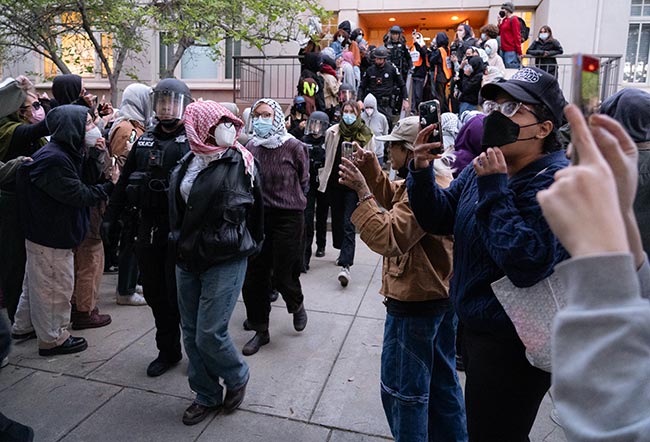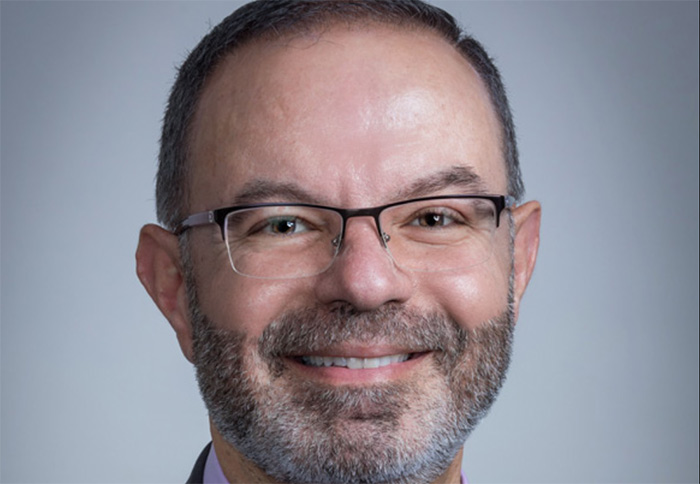Principal makes immediate impact
Sean Delgado, the new principal of San Antonio High School, believes that simple changes can be revolutionary.
His first move at the helm of Claremont’s continuation school has been to create an Associated Student Body (ASB) organization. He has hired Ashley DiGiulio to serve as activities director as well as to teach science. Though starting from scratch, they are enthusiastic about getting San Antonio’s ASB off the ground.
“Activities make school fun,” Mr. Delgado said. “If you make school fun, kids are more likely to go to school and participate.”
The students have been responsive, with a contingent already expressing interest in forming a fashion club. The administrator feels that participation in such associations offers kids an opportunity to pursue extracurricular interests, to foster leadership, to “learn how to fail” and to master important skills like fundraising.
Students transfer to San Antonio because they are at risk of not graduating. Given that Mr. Delgado’s first job out of college was with Boys Republic in Chino Hills, a school for troubled teenagers requiring highly structured supervision, he is used to dealing with kids in need of intervention.
The administrator, however, who previously served as assistant principal at Nogales, Chino Hills and Don Lugo high schools, doesn’t see the students at San Antonio as being much different from other teens.
“I’ve taught students in placement and students going to Yale and Stanford, and I’ve found out that kids all have the same kind of needs,” he said. “They all want to feel accepted and they all have levels of responsibility.”
While students at San Antonio High School (SAHS) often have a number of credits to make up in order to receive their diplomas, Mr. Delgado said what is most needed is often an infusion of confidence.
“I talked to one kid and they said, ‘I’m dumb in math. I’m dumb in school. I’m going to end up like my family, who are all dropouts,’” he related. “What I say is, ‘You haven’t really tasted success, but it’ll happen here. With a little effort, it’ll happen for you.’”
There’s a lot of talent at SAHS, Mr. Delgado said, noting that one student has a black belt, another gets paid $15 an hour as a server at the Candlelight Pavilion and another sings and plays guitar. Sometimes, he said, students get so fixated on their challenges, “they fail to see that the talents they have will carry them through.”
Mr. Delgado, who studied political science at Berkeley and earned his master’s at UCLA, believes his own talent lies in “out-of-the-box” thinking.
One innovative idea he would like to implement at the school, which has about 110 students, is the concept of breaking down the student body into smaller academies. This is something he did at Chino Hills and Don Lugo high schools, where he helped to found academies in the areas of health sciences, performing arts and engineering and design.
He feels specialized learning communities give students a sense of belonging and of excelling in a certain area. They can also offer kids a taste of the future, because a well-designed academy combines core classes with exposure to career training and opportunities.
“It lends relevance and rigor to what we do,” he said.
Mr. Delgado is also excited to build on some of the programs already in place at SAHS, like the Food Justice Program. Overseen by Scripps food politics professor Nancy Neiman Auerbach with the help of Claremont Unified School District garden coordinator Dessa d’Aquila, the program features some 4,000 square feet of garden.
He and his staff are planning to use this resource in a truly interdisciplinary way. For instance, science classes will head into the garden to see biology at work, English classes studying international poetry will use the fruits of the garden to prepare international foods and students in the school’s woodshop will create descriptive signs that turn the garden into a sort of outdoor museum.
One thing that SAHS is lacking, according to Mr. Delgado, a self-described technology buff, is adequate technological resources. He would like to see every student on campus provided with an electronic device such as an iPad and is ready to seek donations, grants and partnerships to make this vision a reality. The timing, he said, is perfect for such an endeavor.
“There is so much more philanthropy going on nowadays—you see people donating through sites like Kickstarter and DonorsChoose,” he said. “People want to be a part of something. I want to capitalize on that and tap into people’s giving spirits.”
Mr. Delgado—whose young family includes wife Sarah, has a 4-year-old son and a 2-year-old daughter, said schools like San Antonio High School face a stigma.
“People see continuation schools as a stepchild, a place where you can banish students,” he said. “No one wants to send their [kid] there unless it’s the only way they can graduate. And it’s hard for those perceptions to die.
“I’ve always felt that it was a personal challenge to make doubters believe,” he continued. “This may sound insane, but I would hope that one day San Antonio would be a destination school. If people would say, ‘I wouldn’t mind, in fact I’d even prefer, sending my student there,’ I’d say to myself, ‘You did your job.’”
Right now, his job is made easier by the fact that CUSD administrators and staffers have thrown their full support behind him as he embarks on his first year at San Antonio High School. Another helpful factor is the cozy nature of the SAHS campus.
“With the smaller size, you feel less barriers between you and the students’ lives. You get to impact students more directly,” Mr. Delgado said. “I’m super excited to get to know the kids better and better every day. They are getting to know me better and going from being skeptical of the new guy to making fun of me.”
—Sarah Torribio
storribio@claremont-courier.com









0 Comments